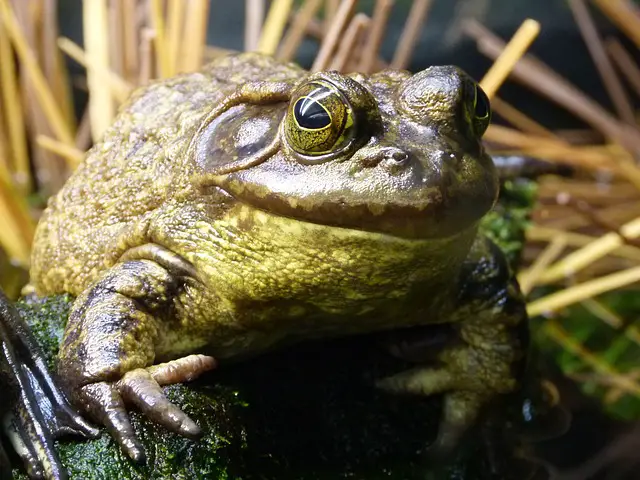Frogs, as we know them, are naturally slim and sleek creatures. However, they don’t have the exact caloric needs as humans or other animals, so it can be easy to wonder if they can get obese like other animals. So let’s take a closer look at obesity in frogs to understand their dietary needs and how to keep them healthy.
Can Frogs be Obese?
Frogs can become obese, although it is uncommon due to the frog’s natural metabolism and limited food sources.
Obesity in frogs is most commonly caused by a lack of dietary variety or the overfeeding of supplemental foods like crickets.
A frog that consumes too many high-calorie foods might become overweight unless its caloric intake is balanced with regular exercise.
Frog owners should observe their pets for signs of obesity, such as an enlarged waistline or difficulty with mobility.
If obesity is present, your pet may benefit from changing to a more varied and nutritious diet and encouraging sufficient exercise through activities like swimming.
Maintaining a healthy weight can improve your frog’s quality of life.
The Calorie Intake of Frogs
Frogs have incredibly varied diets, from beetles and mosquitoes to smaller frogs and fish.
They primarily eat insects, although one study found that frogs consume spiders, small mammals, and bird eggs. The number of calories they need depends on the frog species – some require a large amount, while others can get by with only minimal amounts.
Generally, frogs need more energy during breeding or hibernating than during everyday activities.
For captive pet frogs, it’s essential to provide a balanced diet to ensure their caloric needs are met both now and in the long run.
With proper care and an appropriate diet, you can ensure your frog stays healthy and has a long lifespan.
The Diet of Frogs
For frogs, their diet is highly dependent upon species.
However, most consume various invertebrates, such as insects, spiders, snails, worms, and leeches.
Some opportunistic species also prey on other vertebrates, such as small fish or tadpoles.
Frogs exhibit adaptations such as suction feeding and sticky tongues to capture their prey quickly and effectively. They are generally ambush predators that use camouflage to blend into the environment before lunging onto their unsuspecting target.
This strategy works exceptionally well when the frog is the same coloration and size as the substrate it is perched on.
Health Complications for Obese Frogs
Being obese can be difficult for any organism, and it’s no different for frogs.
While frogs may not have the same kind of diet or physical activity as humans, being obese can still lead to some significant health concerns.
Obese frogs may experience increased susceptibility to diseases and infections, chronic fatigue, and reduced mobility.
In addition to more vulnerable immune systems, they can also suffer from liver disease and organ failure due to the increased demands their bodies must face simply by carrying around extra fat mass.
Knowing what diet best suits a species is critical to managing its health. A healthy balance of vitamins, minerals, and fats is essential to help a frog stay healthy while maintaining an average body weight.
Conclusion
In conclusion, frogs can become overweight if fed too much or given an unhealthy diet; however, this is not common because frogs eat only what they need to survive and maintain their natural slim figure. Therefore, if you own a frog, paying close attention to its diet is essential to remain healthy and active without consuming too many calories or nutrients that could potentially harm its health.
By following these guidelines, you should be able to keep your pet happy and healthy for years to come.




